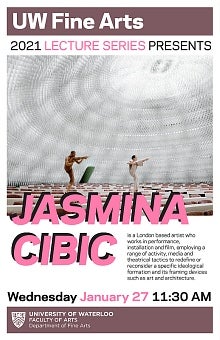
Jasmina will talk about her recent projects and her overall practice which encompasses video, immersive media, performance, and installation, often incorporating architecture as a carrier of soft power.
Please register online at the Webexlink - https://uwaterloo.webex.com/uwaterloo/onstage/g.php?MTID=e5c77354e3f228917ab1284140db760f4. For more information on the lecture please send your questions to Bojana Videkanic or Sharon Dahmer.
Jasmina Cibic is a London based artist who works in performance, installation and film, employing a range of activity, media and theatrical tactics to redefine or reconsider a specific ideological formation and its framing devices such as art and architecture. Her work draws a parallel between the construction of national culture and its use value for political aims, addressing the timelessness of psychological and soft power mechanisms that authoritarian structures utilise in their own reinsertion and reinvention. Cibic represented Slovenia at the 55th Venice Biennial with her project “For Our Economy and Culture”. Her recent exhibitions include solo shows at: Museum of Contemporary Art Ljubljana, CCA Glasgow, Phi Foundation Montreal, BALTIC Centre for Contemporary Art Gateshead, Kunstmuseen Krefeld, Aarhus 2017, Esker Foundation Calgary, Museum of Contemporary Art Zagreb, Museum of Contemporary Art Belgrade, MGLC Ljubljana and Ludwig Museum Budapest along with group exhibitions at Steirischer Herbst ‘19, MOMA NY, MUMA Monash Museum, CCS BARD, Guangdong Museum of Art China, Pera Museum Istanbul, City Gallery Wellington, MSUM Ljubljana, MNHA Luxembourg and California College of the Arts.